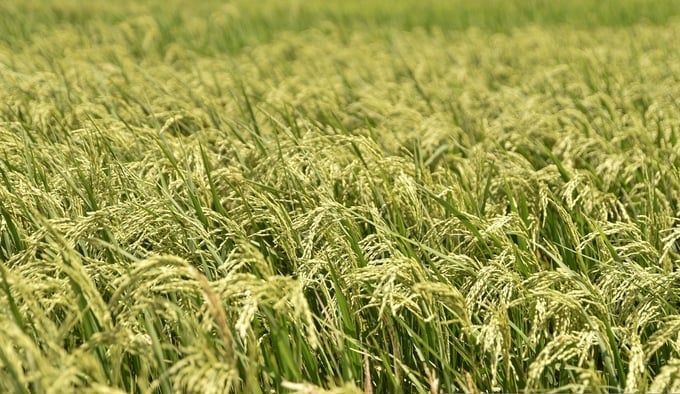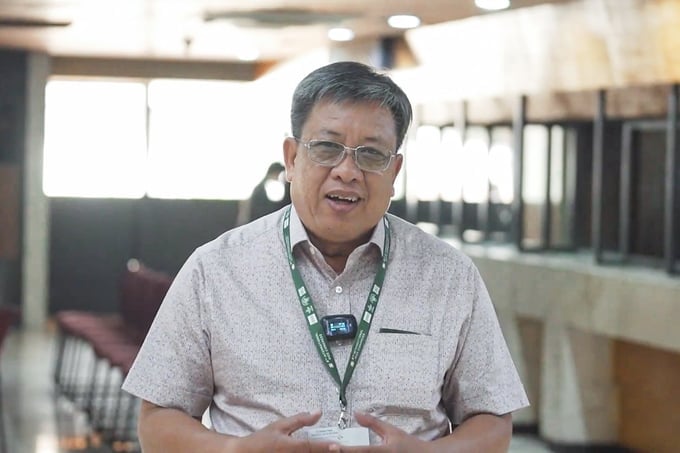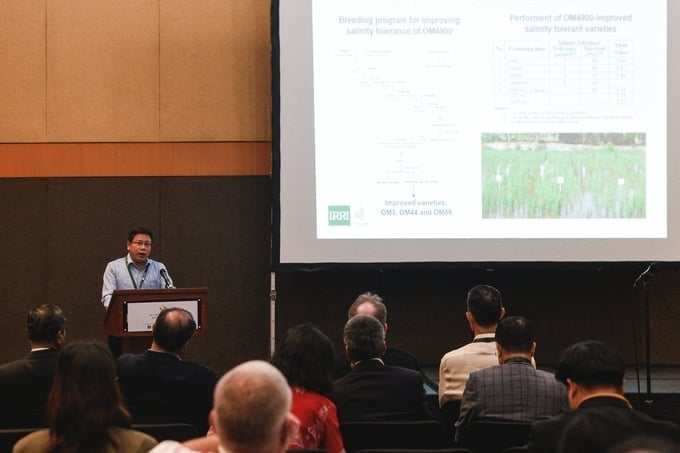May 16, 2025 | 10:33 GMT +7
May 16, 2025 | 10:33 GMT +7
Hotline: 0913.378.918
May 16, 2025 | 10:33 GMT +7
Hotline: 0913.378.918

Experimental model at the Cuu Long Delta Rice Research Institute. Photo: Quynh Chi.
Increasing crop yield is only one of the urgent issues presently facing Vietnamese rice experts. More importantly, given Vietnam's leading role in rice production, export, and global food supply, the country needs comprehensive and synchronized solutions across the entire rice value chain.
The rice production area in the Mekong Delta spans over 3.8 million hectares, which is equivalent to 53.5% of Vietnam's total 7 million hectares. The Delta is facing challenges such as saltwater intrusion and water scarcity due to impacts of severe and continuous droughts within the last ten years.
As a result, 70% of the region's rice production areas have been affected by salinity, leading to a 30% reduction in rice production and causing many farmers to lose their income. This issue has been projected to become more frequent, severe, and have a greater impact on a larger agricultural production area in the near future.
In response to this issue, rice scientists from the Mekong Delta region are collaborating with CGIAR (Consultative Group for International Agricultural Research) within the framework of the "Asian Mega-Delta Initiative" (AMD Initiative). This project aims to seek solutions in areas at risk of dual soil degradation and climate change in Bangladesh, Cambodia, India, Myanmar, and Vietnam.
At the 2023 International Rice Congress, countries participating in the AMD Initiative shared insights into improved rice varieties with enhanced salt tolerance. Accordingly, these varietal developments are driven by national demands. When research institutions have the necessary tools related to rice varieties, it will lay the foundation for diverse, nutrient-rich, and competitive rice production in the international market.

Mr. Le Thanh Tung, Deputy Director of the Department of Crop Production: "Vietnamese rice varieties are the aspiration of many rice-growing countriesin the region." Photo: IRC.
After listening to Vietnamese experts and scientists present various cultivation solutions and prominent research topics, Mr. Le Thanh Tung, Deputy Director of the Department of Crop Production, commented, "After decades of researching on rice varieties, Vietnam has progressed from an impoverished country that only produced for domestic consumption to one that is autonomous, selects markets, and sets selling prices.
Vietnamese rice varieties are the aspiration of many rice-growing countries in the region. There are reportedly 100 different rice varieties within the Mekong Delta region, with approximately 10 dominant varieties. These figures signify market diversity for the economy and biodiversity in service of agricultural production. Thanks to the a wide range of rice varieties, Vietnam faces fewer risks in terms rice production and can adapt to various ecological regions."
As a result, the improvement of rice varieties is one of the top priorities for Vietnamese scientists. It ensures food security, nutrition, and the development of risk prediction systems, enabling policy recommendations and creating new opportunities for the rice industry to adapt to natural disasters and flooding.

Mr. Tran Ngoc Thach, Director of the Cuu Long Delta Rice Research Institute, presenting at the workshop. Photo: Quynh Chi.
At IRC 2023, Mr. Tran Ngoc Thach, Director of the Cuu Long Delta Rice Research Institute, presented on the project of selecting and disseminating improved salt-tolerant rice varieties.
Vietnamese scientific participation in the AMD Initiative was built on the initial success of the country's collaborative research with AFACI (Asia for Cooperatives in Agriculture and Food). Under the AFACI project, the Institute received approximately 40 salt-tolerant rice varieties from international rice research centers. After thorough experiments in the provinces of Soc Trang, Bac Lieu, and Ca Mau, two of the best rice varieties, IRRI147 and IRR117839-22-15-B-CMU10-1-B, will continue to undergo large-scale testing before being put into production in Soc Trang province, an area highly affected by saltwater intrusion.
Within the framework of the AMD Initiative, the Cuu Long Delta Rice Research Institute, in collaboration with the International Rice Research Institute (IRRI), will implement a project titled "Ensuring the food system of Asian delta regions through identifying salt-tolerant rice varieties in Vietnam" in October 2023.
As part of this initiative, the two institutes will conduct seed breeding in key areas affected by saltwater intrusion in three provinces in the Mekong Delta: Soc Trang for rice-shrimp farming, Tien Giang for rice-dry crop rotation, and Kien Giang for rice-rice rotations. Subsequently, scientists will continue to collaborate, conduct research, and find solutions to combat saltwater intrusion before harvest in these distinct rice-growing ecosystems.
In addition to breeding salt-tolerant rice, Vietnamese scientists also presented rice farming methods to enhance salt tolerance in the rice fields of the Mekong Delta. Mr. Nguyen Van Hung, an expert from the IRRI, introduced the CS-MAP solution for predicting and alerting salt levels in crop production. By utilizing CS-MAP, a management system extending from central to local levels and scientists will provide accurate guidance and recommendations to help farmers cultivate their crops.

Application of saltwater intrusion forecasting maps.
In the near future, the CS-MAP solution will be pilot-tested in the Tien Giang province to enhance the resilience of rice fields at risk of saltwater intrusion. The pilot model includes consulting on policies, promoting e-agriculture, and delivering real-time information to farmers.
The AMD Initiative focuses on developing practical and climate-specific production methods across different Asian mega-deltas. It emphasizes the expansion of scale, support for diversified production systems, and the enhancement of the delta's capacity to recover while minimizing environmental impacts and disaster risks. With the assistance of relevant stakeholders, the project will facilitate the technical exchange of land and agricultural science, and ensure the balanced development of value chains.
Additionally, designing measures to enhance nutritional security amidst the rapidly changing climate and trends is imperative. These measures should be based on local contexts and respect regional culture and preferences.
Researchers will concentrate on enhancing skills and knowledge to help small farmers adapt to agricultural production affected by drought and natural disasters. Moreover, they will advise businesses to invest in the entirety of the value chain.
Strengthening the national, provincial, and local management capabilities to support a comprehensive food system will involve encouraging cooperation and investment from the private sector as well as international organizations.
Ultimately, the development of rice fields in delta regions will be based on scientific data, with the aim of establishing a comprehensive food system through policy dialogue.
Translated by Nguyen Hai Long

(VAN) Cold-barn systems efficiently manage environmental and temperature conditions, which aids in the prevention of respiratory diseases in pigs and protects them from the vectors that transmit African swine fevers.

(VAN) To tackle challenges, the project 'Addressing key technical bottlenecks in the grouper supply chain in Vietnam' has been underway since 2024.

(VAN) The project 'Disease-Resilient and Sustainable Cassava Production Systems in the Mekong Region', funded by the Australian Center for International Agricultural Research (ACIAR), is being implemented from 2024 to 2028.

(VAN) Data from 10,000 farming households will help professionalize production organization and support the implementation of the One Million Hectares Program for High-Quality, Low-Emission Rice Cultivation.

(VAN) FAO Director-General QU Dongyu marks International Day of Plant Health at NENA conference.

(VAN) Deputy Minister of Agriculture and Environment Hoang Trung affirmed that floriculture and ornamental plants are a growing industry that receives significant global attention.

(VAN) The three staple crops dominating modern diets – corn, rice and wheat – are familiar to Americans. However, fourth place is held by a dark horse: cassava.